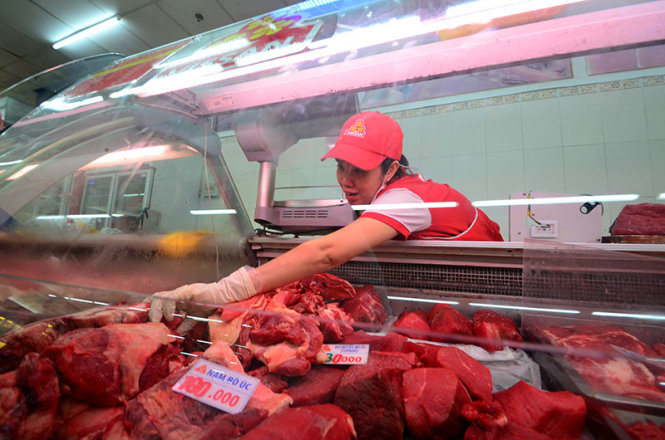The strategy to develop the Vietnamese livestock industry must undergo a thorough overhaul in order to be able to survive challenges expected to stem from the Trans-Pacific Partnership agreement, Minister of Agriculture and Rural Development Cao Duc Phat warned Friday.
Vietnam, as well as the other 11 members of the ambitious trade accord, all released the full text of the TPP on Thursday, meaning all sectors know what challenges are awaiting them when the pact is actually put in place.
“The Vietnamese agriculture industry, particularly the livestock sector, will face myriad challenges then,” Minister Phat said at a meeting held to discuss the TPP commitments of Vietnam’s agriculture in Hanoi.
The Vietnamese livestock sector will be severely affected thanks to its small scale of operations, high production costs, and the failure to meet international food safety standards, the minister elaborated.
Domestically produced beef may fail to compete with products from Australia and New Zealand, the world’s leading exporters of the meat, whereas Vietnam’s beef and poultry are also less competitive compared to those of Canada and the U.S.
The TPP, which was reached on October 5 in Atlanta, also include such party countries as Brunei, Chile, Japan, Malaysia, Mexico, Peru, and Singapore.
“It is certain that we have to review and change the strategy of the livestock and other agricultural sectors,” Minister Phat pressed.
Le ba Lich, a livestock expert, said Vietnam should try to improve its meat quality and cut prices in order to compete with TPP rivals.
“If we can slash price by 30 percent and improve quality, Vietnam’s meat sector is competitive in the TPP game,” he said.
The strategy changes, if effective, will on the other hand enable Vietnam to grab the opportunities provided by the TPP, as other party countries also commit to eliminate tariffs for Vietnamese products.
The U.S., for instance, is slated to eliminate 92.6 percent of the Vietnamese seafood exports, while the figure is 91 percent in the case of Japan.
Canada will eliminate almost 100 percent of the tariffs for all of the agriculture, seafood and wood imports from Vietnamese.
The Southeast Asian country will also have quite a long time to put its agriculture industry to a comprehensive change to battle such challenges and embrace those chances.
Vietnam is required to eliminate the tariff of up to 15 percent on pork imports ten to 13 years after the trade pact takes effect, according to Pham Thi Hong Hanh, from the ministry’s international cooperation department.
The roadmap for the tariff elimination is between eight to 11 years for both the cases of processed pork and poultry.
Fresh and frozen poultry imports will see the current tariffs of up to 25 percent zeroed within 12 years.
The 12 TPP countries are expected to officially sign the deal no later than the end of the first quarter of next year, after which their legislatures will begin ratifying the trade pact.
Vietnam’s lawmaking National Assembly could begin considering the pact in mid-2016, according to The Saigon Times Online.
Like us on Facebook or follow us on Twitter to get the latest news about Vietnam!






















































